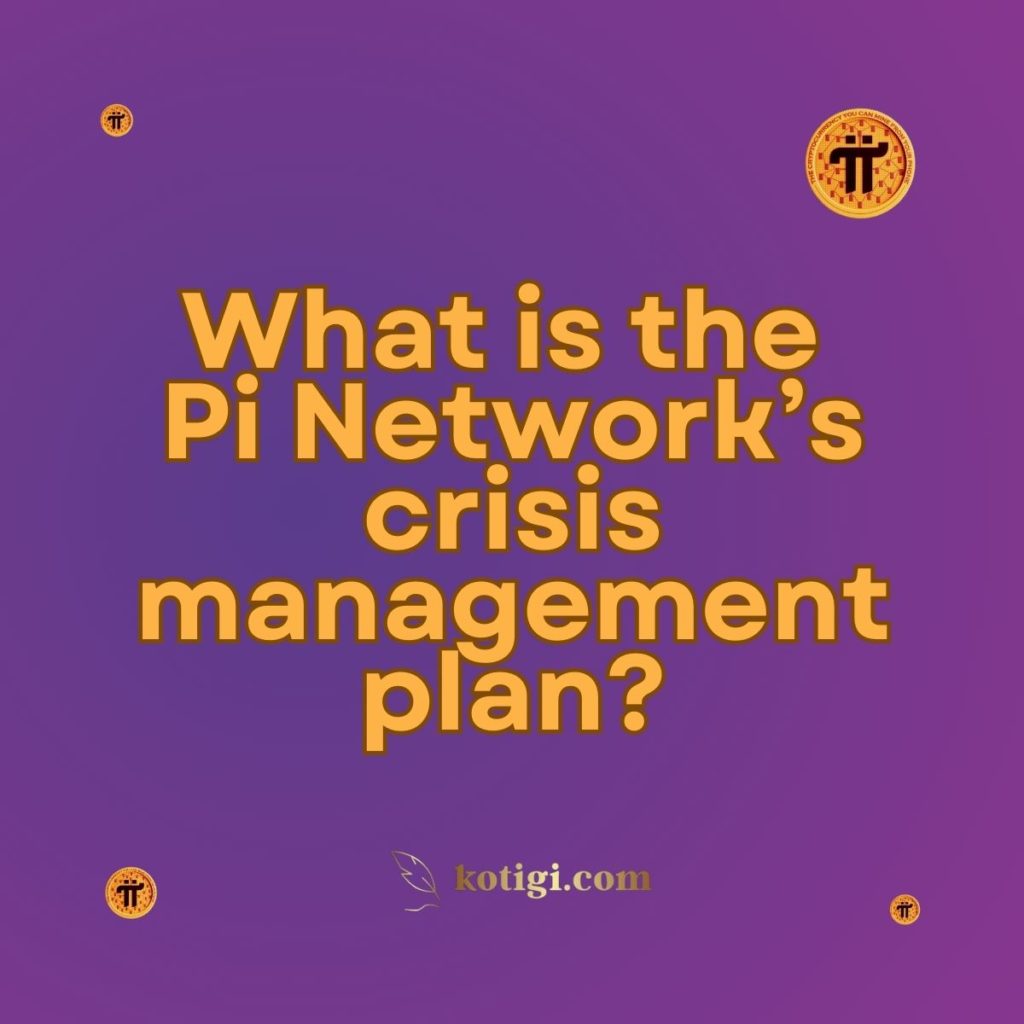
What is the Pi Network’s crisis management plan?
Pi Network’s crisis management plan includes safeguarding user security, maintaining regulatory compliance, managing public relations during crises, and ensuring network stability through community engagement and proactive risk assessments.
Introduction
In any innovative and decentralized ecosystem like Pi Network, the potential for crises—whether security breaches, regulatory hurdles, or market instability—requires a comprehensive crisis management plan. Pi Network’s proactive approach to crisis management ensures that the platform is prepared to handle unexpected challenges while maintaining user trust, security, and network functionality. In this post, we’ll explore Pi Network’s strategies for identifying, addressing, and mitigating crises to ensure long-term sustainability and stability.
Identifying Potential Crises: Pi Network’s Proactive Measures
The foundation of any effective crisis management plan is the early identification of potential risks. Pi Network has established a proactive strategy to anticipate and detect possible crises before they escalate.
Continuous Monitoring of Security Threats
Pi Network continuously monitors for cybersecurity risks that could compromise user accounts, transactions, or the integrity of the network. By using advanced detection tools and regularly updating its security protocols, Pi Network can identify potential threats in real time. This proactive monitoring is crucial in preventing security breaches that could disrupt the platform’s operations.
Regulatory Landscape Awareness
Pi Network’s legal team keeps a close watch on regulatory changes and emerging legislation that may impact the platform’s operations. By staying informed about global and regional legal developments, Pi Network can adapt to new regulations swiftly, reducing the likelihood of legal challenges or shutdowns in key markets.
Market Volatility and User Activity
The cryptocurrency market is inherently volatile, and Pi Network actively tracks market trends and user activity to identify signs of market instability. By keeping a pulse on market conditions, Pi can respond to potential crises, such as sudden price drops or changes in user sentiment, by adjusting its strategies and communication accordingly.
Security Crisis Management
Security breaches are a top concern for any cryptocurrency platform. Pi Network’s crisis management plan includes protocols to respond swiftly to any security-related incident, ensuring the safety of its users and the integrity of its ecosystem.
Immediate Response to Cyber Threats
In the event of a security breach, Pi Network has established an immediate response protocol to isolate and mitigate the threat. This includes temporarily halting transactions or network activity if necessary, conducting a full investigation into the breach, and taking corrective actions to secure the platform. Communication with users is also a priority during security incidents to ensure transparency and maintain trust.
Data Recovery and Backup Systems
Pi Network has invested in data recovery and backup systems to protect against data loss or corruption during a crisis. These systems ensure that even in the event of a significant security breach, Pi Network can restore user data and network operations with minimal disruption. This approach minimizes downtime and ensures business continuity during a crisis.
Enhancing Security Post-Breach
After a crisis is resolved, Pi Network enhances its security protocols to prevent similar incidents from occurring in the future. The platform conducts post-incident reviews to identify vulnerabilities and implements upgrades based on lessons learned from the crisis. This continuous improvement process strengthens the platform’s resilience to future threats.
Regulatory and Legal Crisis Management
Given the evolving nature of cryptocurrency regulations, Pi Network has put in place measures to handle potential legal challenges and regulatory scrutiny effectively.
Establishing Regulatory Compliance
Pi Network maintains a compliance-first approach, ensuring that it adheres to local and international laws, such as anti-money laundering (AML) regulations and data protection standards like the General Data Protection Regulation (GDPR). This proactive compliance helps mitigate the risk of regulatory sanctions or legal challenges. In the event of new regulations, Pi Network adapts its policies and operations accordingly to remain compliant.
Legal Team Involvement
In case of a regulatory crisis, Pi Network’s legal team takes immediate action to address the issue. Whether it’s negotiating with regulatory bodies, handling lawsuits, or ensuring the platform meets compliance deadlines, the legal team plays a central role in managing and mitigating the impact of legal crises. This enables Pi Network to resolve regulatory challenges efficiently without major disruptions to its operations.
Engaging with Regulators
During a legal crisis, Pi Network emphasizes collaboration with regulators to resolve issues and prevent future conflicts. By maintaining an open line of communication, the platform can work with regulatory bodies to ensure a mutually beneficial resolution, helping to secure its long-term viability in regulated markets.
Communication and Public Relations During Crises
Effective communication is critical during any crisis. Pi Network’s crisis management strategy places a strong emphasis on maintaining transparency with users, stakeholders, and the general public.
Transparent User Communication
In the event of a crisis, Pi Network ensures transparent communication with its user base. Whether it’s a security breach, a regulatory issue, or market instability, Pi Network informs users of the situation promptly and provides regular updates as the crisis unfolds. This transparency helps maintain user trust and mitigates panic or misinformation.
Proactive Media Management
Pi Network’s public relations team engages with the media during crises to ensure accurate reporting and to provide the platform’s perspective on the situation. By controlling the narrative and addressing concerns directly, Pi Network mitigates the risk of damaging rumors or negative press coverage that could impact the platform’s reputation.
Social Media Engagement
During crises, Pi Network leverages its social media channels to keep its community informed and engaged. Social media platforms offer a fast, direct line of communication to Pioneers (Pi users), enabling the platform to address concerns, dispel misinformation, and offer reassurance in real-time.
Technical and Network Stability During a Crisis
A critical part of Pi Network’s crisis management strategy is ensuring that its network infrastructure remains stable and operational, even during challenging situations.
Decentralized Network Resilience
Pi Network’s decentralized architecture offers significant resilience in the face of crises. By distributing its operations across a global network of nodes, Pi Network reduces the risk of a single point of failure, ensuring that the platform remains operational even if parts of the network are compromised. This decentralized structure helps prevent network-wide outages, maintaining platform availability for users.
Load Balancing and Scalability
In response to surges in user activity or technical challenges during crises, Pi Network’s infrastructure includes load balancing and scalability measures. These systems allow Pi Network to manage increased traffic or demand on the network, ensuring consistent performance even under strain.
Regular System Audits
Pi Network conducts regular system audits to identify potential vulnerabilities and ensure that its infrastructure is capable of withstanding crises. These audits involve stress tests, security reviews, and performance evaluations to ensure that the platform is prepared for a range of crisis scenarios.
Community and User Support in Crisis Management
Pi Network’s large, active community is a crucial part of its crisis management plan. Engaging with and supporting its user base during crises ensures that the platform remains stable and that users remain loyal to the network.
Dedicated User Support Channels
During crises, Pi Network activates dedicated user support channels to address questions, concerns, and issues. This includes live chat, email support, and community forums where users can report problems and receive assistance in real-time. These support channels help to mitigate user frustration and ensure that concerns are addressed quickly.
Leveraging Community Ambassadors
Pi Network relies on its community ambassadors to communicate with the broader user base during crises. These trusted community members help disseminate official information, provide guidance, and foster a sense of calm during uncertain times. This decentralized support system strengthens Pi Network’s ability to manage crises at the grassroots level.
Conclusion
Pi Network’s crisis management plan is designed to handle a variety of potential risks, from security breaches and regulatory challenges to market volatility and network stability. Through proactive monitoring, transparent communication, and a decentralized infrastructure, Pi Network ensures that it is well-equipped to manage crises and minimize their impact on users. By continuously refining its approach to risk and crisis management, Pi Network aims to build a platform that is resilient, secure, and prepared for the evolving challenges of the cryptocurrency world.
Key Takeaways:
- Proactive Risk Detection: Pi Network continuously monitors security threats, market trends, and regulatory changes to anticipate potential crises.
- Security and Data Protection: In the event of a breach, Pi Network responds immediately and has strong data recovery protocols in place.
- Regulatory Compliance: Pi Network emphasizes adherence to global and regional regulations, reducing the risk of legal challenges.
- Transparent Communication: During crises, Pi Network prioritizes transparency with users, media, and stakeholders to maintain trust.
- Decentralized Network Stability: The platform’s decentralized architecture ensures resilience, even during major crises.
- Community Support: Pi Network leverages its user base and community ambassadors to maintain engagement and offer support during crises.





